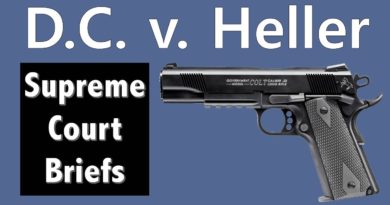Former candidates say New Jersey’s “slogan statutes” violate the First Amendment
Petitions of the week
on May 19, 2023
at 6:40 pm
The Petitions of the Week column highlights a selection of cert petitions recently filed in the Supreme Court. A list of all petitions we’re watching is available here.
Laws governing elections and the right to participate in the political process receive varying degrees of scrutiny when challenged in court. The Supreme Court has held that election laws restricting “core political speech” trigger a high degree of suspicion under the First Amendment. By comparison, laws that simply regulate the “machinery” of elections are subjected to a more flexible balancing test. This week, we highlight cert petitions that ask the court to consider, among other things, what level of First Amendment scrutiny applies to a state law governing slogans that appear alongside candidates’ names on the ballot.
New Jersey’s so-called “slogan statutes” permit candidates in primary elections to have a short phrase – containing no more than six words – listed next to their names on the ballot. These slogans allow candidates to affirm their commitment to a platform goal or align themselves with a faction of their political party. The slogans cannot include the name of any person or a corporation located in New Jersey without their written consent.
Eugene Mazo and Lisa McCormick ran in the Democratic primary for seats in the House of Representatives in New Jersey’s 2020 primary elections. Mazo wanted to name several local wings of the New Jersey Democratic political machine in his ballot slogan, which would have allowed him to be listed together with other machine-backed candidates higher on the ballot, but he never obtained consent to do so. McCormick was was not permitted to use her own campaign’s slogan, which implicitly criticized Bernie Sanders, because a rival had established a New Jersey corporation in that slogan’s name and refused to give consent; she was also barred from using a slogan explicitly criticizing Sanders because she lacked his consent.
Both Mazo and McCormick eventually lost their races. But before the primary elections took place, they went to court to challenge the constitutionality of the slogan statutes. A federal district court dismissed their lawsuit.
The U.S. Court of Appeals for the 3rd Circuit upheld that dismissal. It held that the slogan statutes more closely resemble rules about election mechanics than restrictions on political speech because they regulate ballots, a core component of election machinery. Accordingly, the 3rd Circuit applied the so-called Anderson-Burdick doctrine, under which courts weigh the benefits of a rule governing election procedures on a sliding scale against the rule’s burden on the First Amendment right to participate in the political process. Because the statutes apply to all candidates, the court of appeals reasoned, modest First Amendment scrutiny was appropriate. The 3rd Circuit upheld the statutes, concluding that New Jersey’s interest in preventing voter confusion and protecting named third parties outweighed the burden on speech because Mazo and McCormick had other slogans available to them.
In Mazo v. Way, the former candidates ask the justices to grant review and reverse the 3rd Circuit’s ruling. New Jersey did not have to permit ballot slogans, they argue, but once it did, their regulation should trigger the highest degree of suspicion under the First Amendment because slogans are core political speech. Mazo and McCormick also urge the justices to clarify the Anderson-Burdick doctrine. They argue that lower courts are deeply confused about how to determine whether an election law is a classic restriction on speech, or merely a regulation of election procedures subject to the doctrine’s sliding-scale of First Amendment scrutiny.
A list of this week’s featured petitions is below:
Emily v. Welters
22-1005
Issue: Whether the Minnesota Supreme Court departed from this court’s decisions in City of Tahlequah v. Bond, Rivas-Villegas v. Cortesluna, and many other qualified immunity cases by defining the relevant law at a high level of generality and holding that “less particularity is required to clearly establish what the constitution requires” when engaging in “routine conduct.”
Prime Insurance Company v. Wright
22-1006
Issue: Whether a trip of an empty truck between two locations in the same state qualifies as “transportation of property … between a place in a State and … a place in another State” for purposes of 49 U.S.C. § 31139(b)(1).
Moeser v. Wisconsin
22-1018
Issue: Whether a sheriff (1) who indisputably did not make an oral or written oath or affirmation to anyone and (2) who falsely signed a pre-printed affidavit stating that he had been “first duly sworn on oath,” (3) which was in turn notarized by a fellow law enforcement officer who also falsely asserted in the jurat that the affidavit had been “sworn to,” nevertheless “supported [the warrant application] by Oath or affirmation” for purposes of the Fourth Amendment because “the [original] officer was impressed with th[e] obligation” to tell the truth.
CoreCivic, Inc. v. Owino
22-1019
Issues: (1) Whether courts of appeals reviewing class-certification decisions under Federal Rule of Civil Procedure 23 must, as a matter of law, give district court decisions granting class certification “noticeably more deference” than rulings denying class certification; and (2) whether Rule 23(a)’s commonality requirement is satisfied through the assertion of a purportedly class-wide policy without significant proof that such policy is uniformly applied class-wide.
Mazo v. Way
22-1033
Issue: Whether a state that permits political candidates to engage in core political speech on the ballot may restrict that speech on the basis of content and viewpoint without satisfying strict scrutiny.






